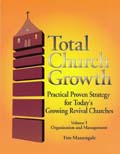
By Tim Massengale
Developing Workers
Research has shown that churches tend to grow in jumps or spurts. Between each jump the church will experience a “plateau.” A plateau has occurred when the church has seen no growth for at least one full year. If you are the same size this year as last year, you may be on a growth plateau. Where the plateau occurs varies between churches. But generally a church will experience one somewhere around 50, then another between 70-90, and a third around 130-150, then finally 250- 300. After 300, another will often appear at 500, then 700, then just short of a thousand. Unfortunately, many churches are in this plateaued condition. Try as they might, they seem to be sitting on dead center. Revivals, programs, crusades all help for a while, but they always seem to slide back into the same average attendance. And as any pastor can tell you, this stagnant period of non-growth can be very discouraging. What is wrong?
The cause of these growth plateaus also varies. The building may be a restrictive factor, financial condition may hinder, or the pastor having to work – these are just a few. But the most common reason, the one reason that applies to almost every level of plateau, is this: they lack of organizational structure, ministry leaders, and workers to support a larger church body. It is vial for every pastor to understand that in order to expand the church membership, he must first expand the leadership and worker base.
The growth of a church will rise or fall on ministry involvement. David Womack, in his book The Pyramid Principle, states, “before a church may add to its mass of members and adherents, it must expand its base of organization, ministry leaders and ministry workers.” He goes on to describe church growth as being similar to piling sand on a table. You can pile on only so much sand before the table is covered. When you have no more space, the sand begins to spill off onto the floor. If you want to add more sand to the table, you must first expand the table size. This is the point of the pyramid principle: you must first add to the leadership and worker base before you can effectively add to the membership size.
Critical Training
For this reason, each year it is important to set aside key training times for critical ministries within the church. Training is essential. For the most part, ministry workers are volunteers. They have not been chosen because of their past experience, nor have they been selected because they went to college or received specialized training for their position. They were chosen because they were willing, carried a burden for that work, and desired to be used of God. Their motivation is not a paycheck, but rather storing up treasures in heaven. Help them be their best. Key ministry training to consider during the year are as follows:
- Sunday School Teachers – Held at least annually. Extremely important.
- Home Bible Study Teachers – Held 3-4 times a year. Emphasis on new converts attending.
- Choir Clinic – Requires bringing in a skilled clinician. Done annually or bi-annually.
- Bus Worker Training – Emphasize keys to bus ministry success (ie – how to win parents).
- Visitor Follow-up Workers – Teach keys to making a successful follow-up visit.
- Soul Winning Training – How to witness. Often taught to entire church on Bible study night.
- Usher / Hostess Training – How-to’s, do’s/don’ts, emergency procedures. Very important!
- Altar Working Seminar – Often taught to entire church. Should be taught annually.
- Financial Freedom Seminar – Often called ‘Stewardship Seminar.’ How to manage your money.
- Youth Seminar – Covers key topics faced by today’s youth. Held annually.
- Service Gifts Seminar – Importance of finding your gifts and callings. Taught to entire church.
Most of these do not require bring in an outside expert, although that is certainly an option. They can be effectively taught by the pastor or leadership staff. Some can be held during normal service times. Others require a Saturday seminar or several weekday evenings.
How To Get Needed Workers
How do you get the leaders and workers needed to staff an expanding organization and insure a growing, healthy church? If a pastor will diligently pursue the task and make the effort needed, God will bless him with the needed workers and leaders. Remember the promise of the Apostle Paul in Phillipians 4:19: “But God shall supply all your needs according to His riches in Glory by Christ Jesus.” Surely the need for quality leadership and faithful workers falls within this promise!
In his book Organize to Evangelize, Larry Lewis defines three ways to enlist needed volunteers. Perhaps each way should be employed in every church. No one way will work by itself.
- Pray for Workers and Leaders.
Jesus himself gave the ultimate solution to the problem when He said, “Pray ye therefore the Lord of the harvest, that He will send forth laborers into His harvest” (Matthew 9:38).
Just as important as praying for souls, or for God to provide the money to meet the building payment, is the need to pray for leaders and workers. This is not a “suggestion” our Lord made. Jesus commands us to pray for leaders and workers. Might this be the reason many churches complain of a leadership and laborer shortage?
“Ye have not because ye ask not.” “Ask and it shall be given unto you.” “If you ask anything in my name, I shall do it.” “Seek and ye shall find.”
Pastor, have you diligently called upon God to send you a Home Bible Study Director? Have you sought earnestly for an Outreach Director and good Visitor Follow-up workers? Do you make this a matter of public prayer? Have you stood behind the pulpit and said, “Church, let’s pray that God will provide us with a good New Convert Care Director?” Do you ask for God to reveal a particular person to you? Do you then pray for the Lord to burden that person with that ministry before your ask him or her?
How quick we are to complain and how reluctant we are to pray! May God turn our complaining into praising, our murmurings into heart felt petition, and our skepticism into trusting faith to claim these mighty promises and pray for the leadership God will provide.
- Preach for Workers and Leaders
Long ago the Prophet Isaiah heard the Divine call, “Whom shall I send, and who will go for us?” The voice of God has continued through the ages “calling out the called” to labor in the harvest. As the mouthpiece of God, the Pastor must not hesitate to preach for workers and leaders.
Jesus preached for workers. He emphasized the urgency of the hour when He said, “I must work the works of Him that sent me while it’s day: The night cometh when no man can work.” To a group of rugged fishermen He cried, “Follow Me, and I will make you fishers of men.” Surely, every true Christian yearns to be a faithful servant and an effective “soul-fisher;” to respond to the celestial voice and say, “Here am I; send me.”
Shouldn’t the present-day prophets of God preach for workers? Shouldn’t men of God preach that the Lord needs good leadership within the church? We give an invitation for souls to come to the altar, for members to rededicate their lives. Shouldn’t we also make a plea for needed leadership?
Why not say in the invitation: “Is God calling someone here to be a Sunday School worker? Is God calling someone here to be a Home Bible Study teacher?” (You don’t want them serving if God hasn’t called them).
People need to be taught and reminded about the biblical imperative of using their God given talents and abilities for the work of the Lord. They must see themselves a stewards of their gifts and skills. It is not an issue between them and the pastor. It is an issue between themselves and God. If the fig tree gives no fruit, it will be cursed and cut down.
- Personally Enlist Workers And Leaders
Where the commitment service works best for getting workers for your various ministries, the personal enlistment works best for selection of department and ministry leaders.
Remember the parable of the husbandman in Matthew 20? What did he do about the worker problem? Did he murmur, complain, and gripe? No. Rather he “went out” after them. He went out the first hour of the day, then he went out again the third hour, and again the sixth hour, and again the ninth hour, and even until the eleventh hour.
What did he say to these potential laborers when he found them? Notice his appropriate question, “Why have you been standing here all day doing nothing?” (Matt.20:6-7). What a question for every pastor to consider! Souls all around us are on their way to hell; sin is on every hand; and leaders are needed in the church to help lead the people. Why do so many stand idle, doing nothing?
Notice the answer they gave: “Because no man hath hired us.” This is exactly the reason so many pastors find themselves short of quality leadership. This is why so much talent is going to waste. No one has personally sought to enlist these people. Sometimes pastors have problems with saints simply because they are bored from doing nothing. They are not being used in the harvest and their gifts and abilities are lying idle. No one has truly put forth the effort to train and recruit them for leadership and service.
How do you determine a potential leader? Ask yourselves two questions: Would this person be acceptable as a leader if he or she agreed to serve? Could this person, after the proper training and development be made acceptable to serve? If you can answer either question as “yes,” then write the name down. Go through your entire membership roll this way. Make a list. Then match the names to the positions. Pray for these people for God to burden them, then ask them.
When going through your church membership list, never ask, “Will this person serve?” That is not for the pastor or department leader to decide. Let the person decide for themselves. You will not stand in judgment to answer for them. This they alone must do. Our place is only to call to service. Their answer might surprise you.




1 thought on “Recruiting and Training Laborers for the Harvest (Entire Article)”
Comments are closed.